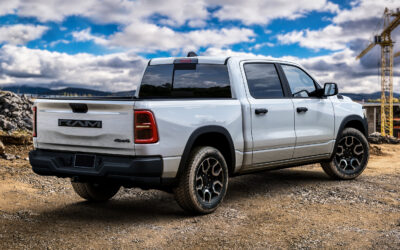Winter Truck Maintenance Tips
Icy cold winter weather is right around the corner. Although trucks need year-round maintenance, the winter season is a crucial time for extra care. As the cold temperatures drop, and rain/snow falls, it’s considerably more dangerous for fleets and harder on engines. Let’s explore some of the top winter truck maintenance tips that can be used before and during winter to keep your wheels on the road year-round.
Winterized Fuel
Ensure your fuel system is equipped with anti-gelling additives to prevent fuel from thickening in cold temperatures, ensuring smooth engine performance even in the harshest winter conditions. Cold weather can cause diesel fuel to gel, leading to clogged filters and engine problems. Using a winter-grade fuel or an anti-gelling additive can safeguard your engine and ensure uninterrupted operation during freezing temperatures.
Avoid Cold Soaks
Park your truck in a garage or use a block heater to prevent engine fluids from reaching dangerously low temperatures overnight. Extremely cold weather can cause oil and other fluids to thicken, making it harder for your engine to start smoothly. By parking indoors or utilizing a block heater, you maintain warmer temperatures in the engine, facilitating easier starts and reducing wear on engine components during cold weather.
Check Tire Tread and Pressure
Regularly inspect tire tread depth and maintain proper tire pressure. Winter driving demands adequate traction to navigate through icy and snow-covered roads. Worn-out tires with insufficient tread can significantly reduce grip, increasing the risk of accidents. Maintaining proper tire pressure ensures optimal contact with the road surface, enhancing stability and maneuverability in challenging winter conditions.
Check the Batteries
Regularly test your battery’s charge and clean terminals to avoid potential starting issues in cold weather. Low temperatures can weaken a battery’s ability to hold a charge, leading to difficulties in starting your truck. Proper maintenance and ensuring a strong charge help prevent unexpected breakdowns due to battery-related issues during winter.
Check Fluid Levels
Monitor and top up all essential fluids, including antifreeze, oil, and windshield washer fluid, to prevent freezing and ensure optimal performance. Cold weather can cause fluids to thicken or freeze, potentially damaging crucial components. Adequate levels of fluids with the appropriate cold-weather ratings are essential to maintain the proper functioning of your truck’s systems during winter.
Check Your Brakes
Have your brakes inspected to guarantee they’re in top condition for winter driving conditions. Cold temperatures can impact brake performance, and road surfaces may be slippery. Ensuring brakes are in optimal condition is crucial for safe and responsive braking, helping you navigate safely through icy roads and unexpected hazards.
Keep Your Fuel Tank Half Full
Maintain at least half a tank of gas to prevent fuel lines from freezing in extremely cold temperatures. Condensation can build up in empty or near-empty fuel tanks, leading to fuel line freeze-ups, which can leave you stranded. Keeping your tank at least half full minimizes condensation and ensures your truck remains operational during severe winter conditions.
Block Heaters for Engine
Utilize block heaters to keep your engine warm, aiding in smoother startups and preventing cold weather-related issues. Block heaters keep the engine block and coolant warm, making it easier to start the engine in cold weather. They also reduce wear and tear on engine components caused by cold starts, improving overall reliability during winter months.
Replace Your Wipers
Ensure clear visibility by replacing worn wiper blades with ones suitable for icy conditions. Visibility is crucial for safe driving in winter weather. High-quality, winter-specific wiper blades help remove snow and ice more effectively, ensuring a clear view of the road, and enhancing safety during adverse weather conditions.
Be Prepared For Anything
Equip an emergency kit with essentials like blankets, a flashlight, extra clothing, non-perishable snacks, and tools in case of unexpected winter breakdowns. Winter weather can be unpredictable, and having an emergency kit on board ensures you’re prepared for unforeseen situations, providing comfort and assistance until help arrives.
Preparing your truck for winter isn’t just about adapting to the cold; it’s about ensuring safety, reliability, and peace of mind during the season’s unpredictable weather. By following these comprehensive maintenance tips, you’re not only safeguarding your fleet but also ensuring a smoother and safer journey through the snow-covered roads.
At Summit Fleet, we understand the importance of keeping your fleet in top shape year-round no matter the industry you work in. Whether it’s maintaining your truck’s performance or offering a range of reliable vehicles suitable for winter conditions, we’ve got you covered. Visit our blog for more expert insights and tips on optimizing your fleet’s performance in every season.
Don’t let winter slow you down—prepare your truck for the cold and keep rolling with confidence! Contact us today to explore our winter-ready fleet and experience hassle-free travels.”
Check out our video for a quick rundown of some top winter truck maintenance tips:




